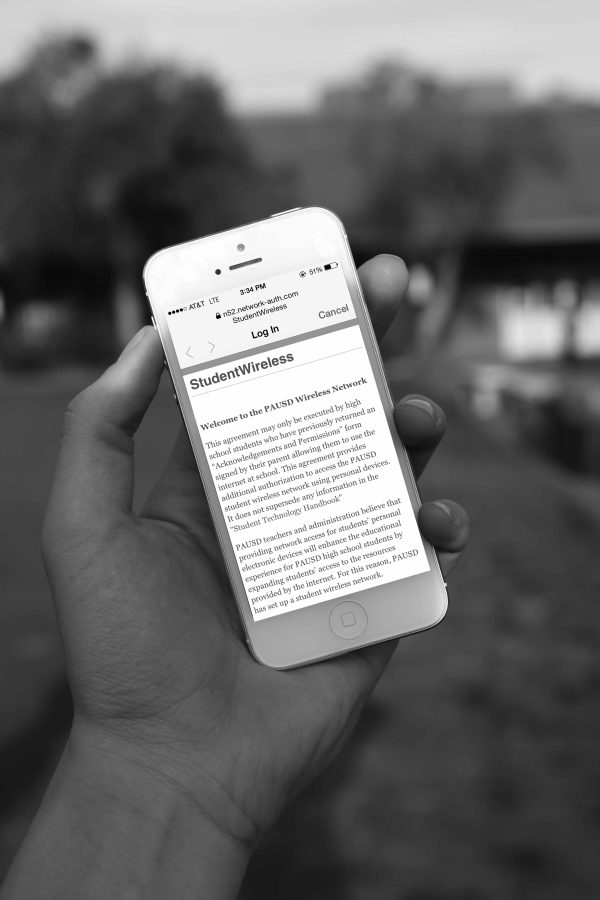Students should be aware of Student Wireless
If you have logged in to the Student Wireless before then you know about the annoying splash page that comes up with a “Welcome to the PAUSD Wireless Network” message. You scroll down to the bottom of the screen and press “Accept and Continue” without really reading any of the terms in between the two phrases. For kicks, I read the fine lines of the agreement students contract to when they press “Accept and Continue.” After reading it, I promised myself to never use the Student Wireless again, as should you.
To begin, Palo Alto Unified School District’s Student Wireless agreement has a list of items that are deemed inappropriate for students to use while on the network. While most of them are obvious, like not to torrent movies or hack tools, some terms are somewhat vague and give the administration the power to come after almost any student. Section Seven Letter E states that while using Student Wireless, students are forbidden from “participating in political activities.” What is a “political activity?” According to PAUSD, it is not solely confined to speaking out and professing one’s own opinions. The fact of the matter is that “political activities” needs to be more explicitly defined, and if the terms are rewritten, they should not infringe a student’s right to free speech, as guaranteed by the First Amendment of the Constitution.
Now is the time to expose PAUSD’s snooping efforts. Section Eight states that users of the Student Wireless network should have “No Expectation of Privacy.” The district can and does monitor Internet access and activity on its network, including, but not limited to, sites visited, content viewed and e-mails sent and received. The district may examine a student’s personal device and search its contents if there is reason to believe that school policies, regulations or guidelines have been violated.
After reading this, you should recognize that you give up your Fourth Amendment rights that protect you from illegal search and seizure whenever you press “Accept and Continue.” The district or any administrator should not have the ability to search a personal device for any reason because it would require a warrant in the real world. Fooling students with large bodies of text is unethical and immoral to impose on the students just so they look over the ability for the administration to search anyones electronic communication devices.
Furthermore, the district also has the power to look over students’ e-mails, both sent and received. This again would require a warrant anywhere off campus and should again require a warrant at Paly. Students need to realize that the administration should not have the power to read over students’ private and personal matters.
On top of all this, students should think twice about pressing “Accept and Continue” to use the Student Wireless network. The administration and PAUSD should alter these policies to not waive constitutional rights, and in the meantime, the Student Wireless network should go “radio silent,” meaning no connection whatsoever to any of PAUSD’s snoopable networks. However, this is not the most astonishing part of this whole controversy. This body of text has been in place since the Student Wireless network was activated back in 2010. No one spoke up and therefore none of the policies were changed. Maybe that is what the Living Skills curriculum should adress: the importance of reading a contract or agreement before signing or agreeing to one.
Your donation will support the student journalists of Palo Alto High School's newspaper


F • Jan 27, 2014 at 4:54 pm
None of these terms are concerning. All that this does is give PAUSD the right to keep track of what is going on *on their own network*. There *shouldn’t* be an expectation of privacy. The district doesn’t want to be liable for activity on their network. If you don’t want them to be able to monitor what happens so that they can enforce the necessary restrictions, then don’t use Student Wireless.